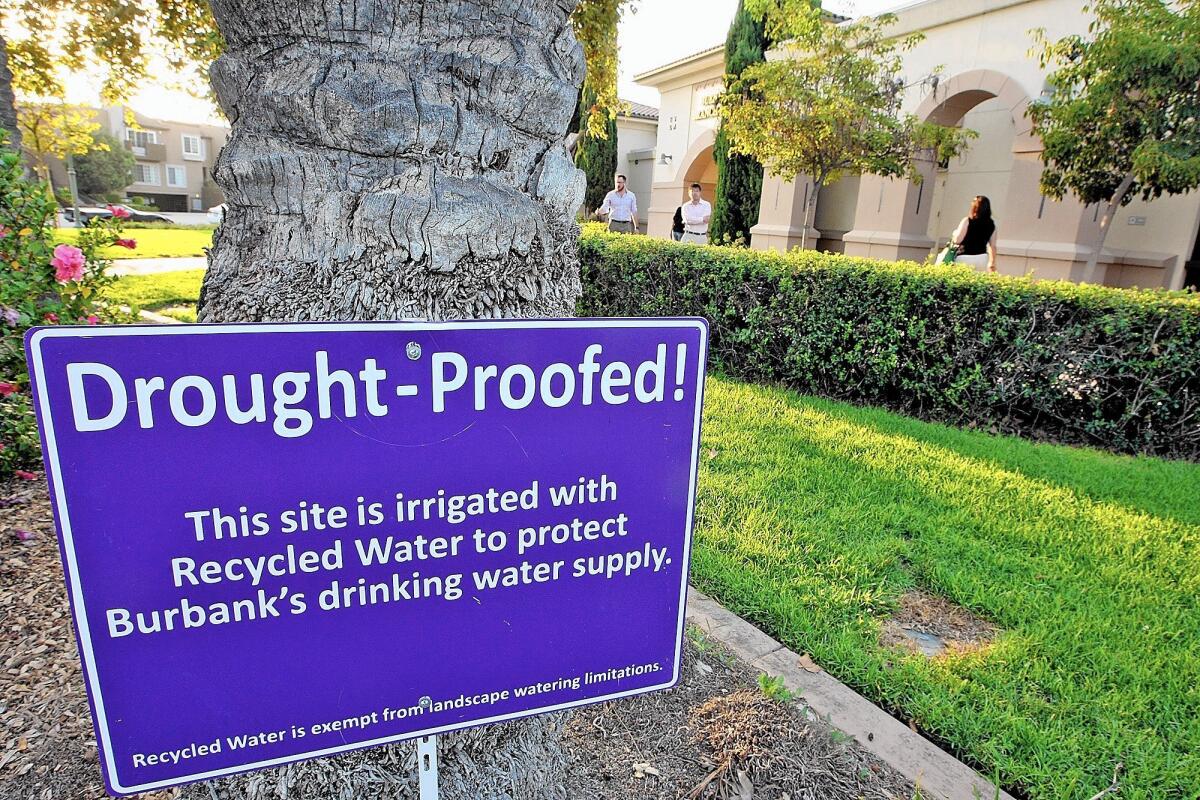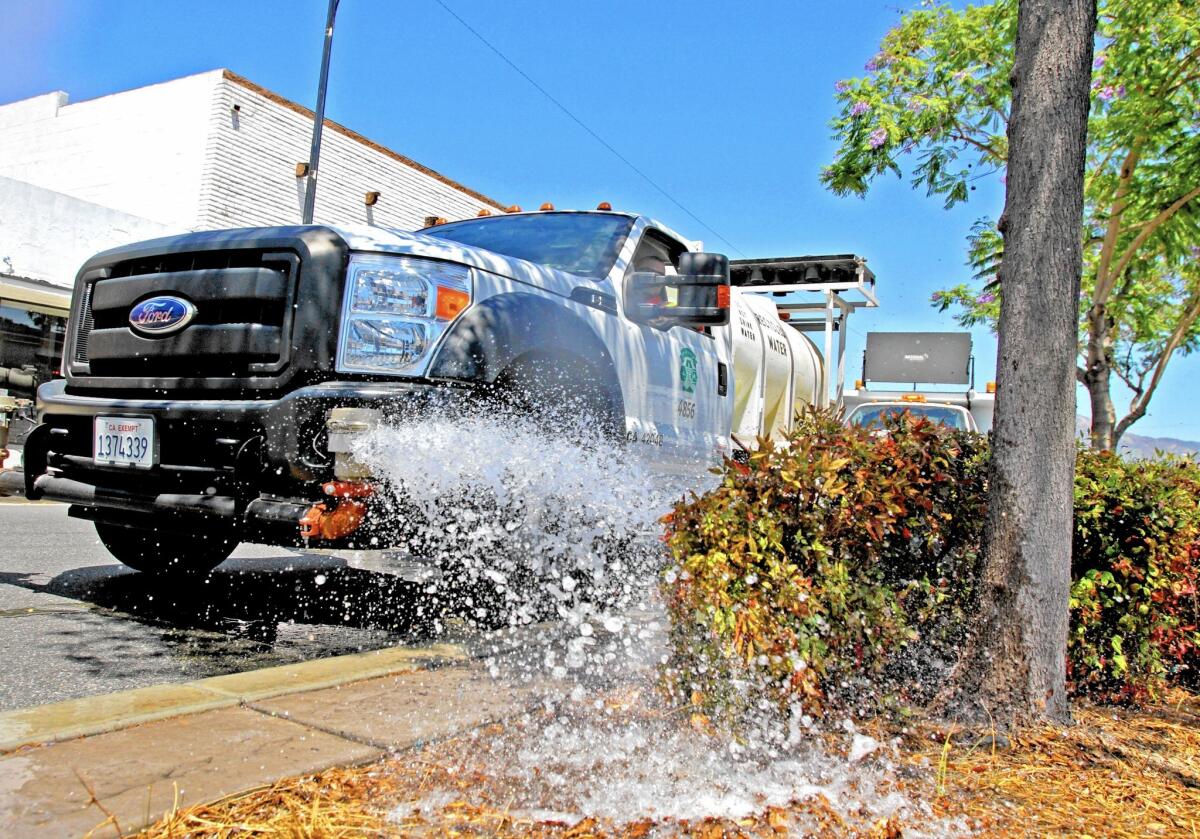Newsmaker of the Year: Residents answer drought alert

A sign outside of the Buena Vista branch of the library indicates the landscaping is being irrigated with recycled water.
Recent reports of a higher-than-average snowpack in the Sierra Nevada may inspire some glimmer of hope for an eventual end to California’s ongoing drought, now in its fourth year, but for Burbankers, 2015 was a year of stepped-up efforts at water conservation — many permanent — to prepare the city to endure continued extreme dryness.
As of November, Burbank residents and businesses had saved 961 million gallons of water since Gov. Jerry Brown’s executive order mandating 25% reductions in urban water use statewide went into effect in June, according to the Burbank Water and Power website, which is tracking the city’s progress toward saving 1 billion gallons by the end of February.
Residents and businesses have responded to the state mandate to curb Burbank’s water use by 24% from June to February, cumulatively, compared to a 2013 baseline, surpassing that target, so far. Through October, Burbank had used 27.8% less water than the same June-to-October period two years ago, according to data released last month by the State Water Resources Control Board.
On average, each city resident used 30 gallons less per day in October 2015 than in the same month the year prior, continuing a trend of per-capita daily water conservation that has hovered around that mark since June, the data showed.
The city imposed tighter restrictions on water use beginning this summer and also stepped up enforcement of the stricter rules with fines. However, officials also passed new or increased rebates for water-conservation efforts and created a way to let residents and businesses access recycled water to offset their diminished use of fresh water during the hotter, drier summer months.
In addition to taking shorter showers and turning off the faucet while brushing their teeth, residents were required to make bigger behavioral changes under the city’s stage three of the city’s water conservation ordinance, which took effect June 1.
The restrictions ban misters, limit hand-watering of landscapes during the day, restrict outdoor sprinkler use from three days a week to two days — only one during winter months — and require covers on swimming pools and wading pools.
Many residents have also taken advantage rebates offered through the city’s utility, in conjunction with the Metropolitan Water District, for replacing live turf with drought-tolerant plants or artificial turf.
The combined rebate of $3 per square foot — $2 of that from MWD — is no longer available, since residents throughout the region sucked the MWD program dry of its $450-million budget earlier this year, but residents can still apply for $1-per-square-foot rebates from the Burbank utility.
Additionally, the utility updated its rebate programs this year to encourage more conservation, such as doubling rebates to residents for purchasing eligible clothes washers, dishwashers and pool pumps, while increasing rebates for air-conditioning units by $20 per ton of capacity. A new rebate created this year pays up to $50 of the cost for pool covers.
In response to concerns raised by Burbank City Council members and residents about the use of water for a temporary holiday season skating rink in downtown Burbank, the water used for the ice was switched to be mostly recycled water. Only 25% of the roughly 10,000 gallons of water used will be drinking water.
The city also reused thousands of gallons of dechlorinated water from McCambridge Pool rather than flush it all down the storm sewer.
Large commercial and institutional water users in Burbank have also been cutting back. Walt Disney Co. has started converting its cooling towers at its studio lot in Burbank to use recycled water, which is exempt from the state’s mandated cuts. This summer, several cooling towers on the Warner Bros. lot were also converted to recycled water, a move expected to save 8.2 million gallons annually.
Providence St. Joseph Medical Center completed the conversion of the final 20% of its irrigation systems and finished a $350,000 effort to convert its cooling tower to recycled water at a savings of 15 million gallons a year.
Burbank Unified converted irrigation systems at eight schools to recycled water this spring to meet the June 1 deadline after Burbank Water and Power officials threatened to turn off irrigation at the schools until the conversion was complete.
Officials at Bob Hope Airport reduced the washing schedule for airport vehicles to once every two weeks, modified toilets to use only half a gallon of water per flush and, where possible, began irrigating landscaping with recycled water.
Car-wash stations that the rental-car vendors at the airfield use is also supplied with the treated waste water that’s deemed suitable for all purposes except human consumption, and the car-wash water is reused throughout the day.

Burbank Water and Power workers water median trees with recycled water.
With so many efforts underway to cut back, the city’s utility also stepped up enforcement of rules limiting outdoor watering this year and began analyzing user data to alert customers of overuse or likely leaks in their pipes. From April through October, the utility has received nearly 3,200 complaints, issued more than 2,800 warnings and assessed 165 fines, according to state data.
Fines, which are $100 for first-time offenses and can increase to up to $500 for repeat offenders, are issued after two warnings. The city itself faces potential fines of up to $10,000 a day if it doesn’t meet the state-mandated cuts.
However, as the city turned up the pressure with its enforcement efforts, there have been some problems. This summer, the city sent more than 6,500 letters to residents suspected of watering on the wrong days or simply using a lot of water, though more than 500 people called the city to complain that they had been unfairly targeted.
--
Chad Garland, chad.garland@latimes.com
Twitter: @chadgarland
